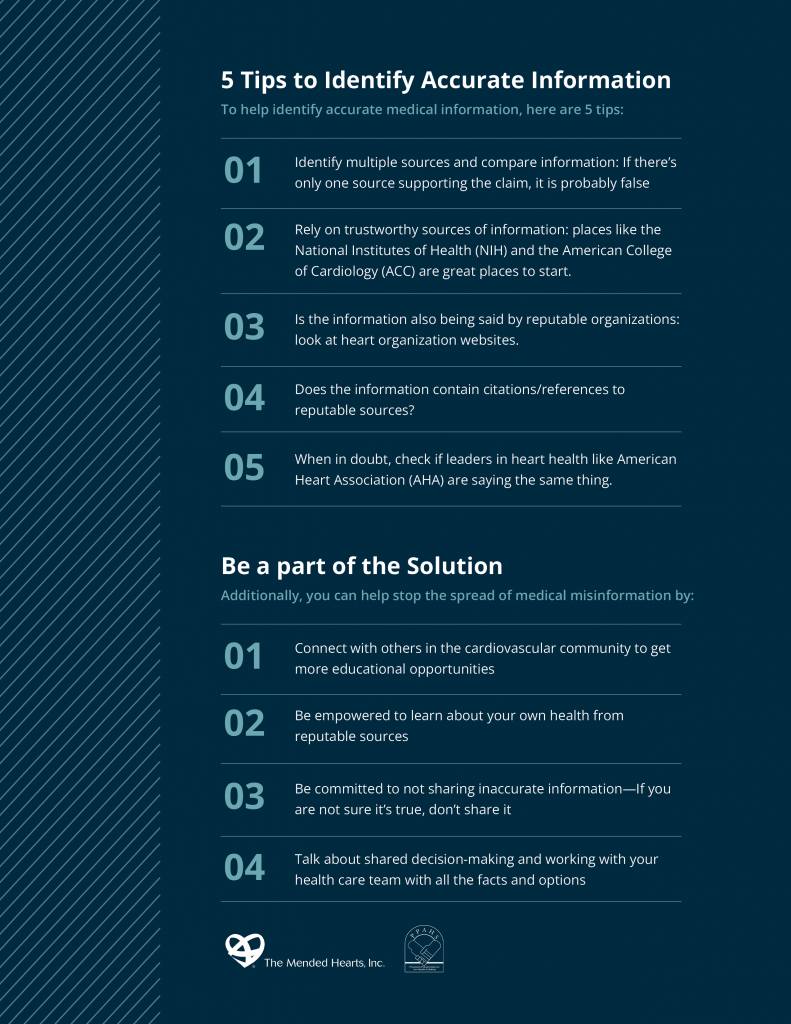Misinformation Can Be Catastrophic for Cardiovascular Patients
By Andrea Baer and Michael Wong, JD
Making sure you have correct medical information—rather than misinformation (i.e., false information)—could save you from being admitted to the hospital or even save your life.
There is a lot of medical information and education on cardiovascular disease, particularly on the internet. But with that comes the problem of misinformation. Finding trustworthy information can be challenging, and relying upon wrong information can have health ramifications. Just because something is on the internet does not mean it’s medically true.

In research published in the American Journal of Tropical Medicine and Hygiene, researchers found that approximately 5,800 people were admitted to the hospital as a result of false information on social media. This research, conducted between December 31, 2019, and April 5, 2020, reviewed websites, television networks, newspapers, and fact-checking agencies worldwide, as well as data from the WHO and the CDC.
Moreover, in an analysis conducted by National Public Radio, researchers found that approximately one-third of the 1 million COVID-19 deaths in the U.S. were the result of medical misinformation and could have been prevented.
For cardiovascular patients, relying on medical misinformation can result in physical harm and even death. An editorial published in the Journal of the American Heart Association concluded:
One significant cause of suboptimal use of our prodigious tool chest is medical misinformation hyped through the internet, television, chat rooms, and social media. In many instances, celebrities, activists, and politicians convey false information; not uncommonly, authors with purely venal motives participate.
… people who decline to use a statin when recommended by their physician, or parents who withhold vaccines from their children, put lives in harm’s way.
The lead author of the editorial commented: “There is a flood of bad information on the internet and social media that is hurting human beings. It’s not just an annoyance; this actually puts people in harm’s way.”
The AHA editorial cites patients’ refusal to use statins as the primary example of how following medical misinformation can be harmful. Statins are a cholesterol-lowering medicine that can reduce the risk of heart attack and stroke. Unfortunately, physicians report that many patients refuse to take statins because of information they have heard—often from politicians, celebrities, and others who lack medical expertise.
As the executive directors of two nonprofits dedicated to improving patient safety and care quality, we understand that it can be extremely difficult to determine what is medical misinformation and what is accurate medical information. In today’s world of social media and the internet, there is just so much information out there that needs to be sorted through.
We also recognize that the question of “who the experts are” is even harder for patients to answer. The fact that anyone can pretend to be a doctor online is a serious concern and can lead individuals to follow bad medical advice. That, along with home remedies being shared as a way to avoid the healthcare system, all leads to a deadly storm for cardiovascular patients.
Moreover, everyone desires quick answers to questions. Nobody has the time to engage in extensive, PhD-level research every time they read an article or hear something on the news, and waiting to seek medical help can be dangerous. Finding ways to identify medically accurate information quickly is an important skill to have as a patient.
For example, during the COVID-19 pandemic, researchers found that cardiovascular deaths occurred because of patients delaying medical attention or because of undiagnosed COVID-19. Patient organizations, along with industry partners, helped to cut through the misinformation and remind individuals that if they experience symptoms of atrial fibrillation, deep vein thrombosis, or pulmonary embolism, there is No Time to Wait.
Andrea Baer is executive director of The Mended Hearts, Inc. Michael Wong, JD, is founder and executive director of the Physician-Patient Alliance for Health & Safety.
